During this hot summer, Copper Canyon Press invites you to welcome the season in and onward with a selection of our books and books from our fellow independent presses. Members of the Copper Canyon Press team have chosen books that they enjoy and recommend to add to your summer reading list. We’ll be sharing more selections in the coming summer weeks, so check back!
Kate’s (Intern) Summer Book Choices
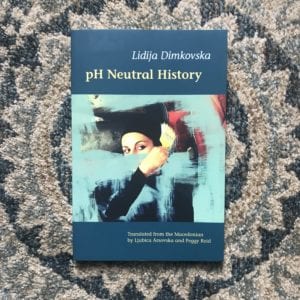 What brought you to this book for the summer?
What brought you to this book for the summer?
Kate: One of the things I admire most about Copper Canyon Press is the dedication to publishing poetry in translation. This summer, I wanted to become more familiar with the translation backlist—women in translation, in particular—and I wanted to read a poet whose work was completely new to me. Enter Lidija Dimkovska’s pH Neutral History, translated from the Macedonian by Ljubica Arsovska and Peggy Reid. I picked this book precisely because I knew nothing about it, and I wanted to venture beyond my usual Anglo-centric reading. The risk paid off—I haven’t been able to stop thinking about these poems.
Which poem in this collection stands out to you?
Kate: I’m especially fond of the fourth section in the book’s long sequence, “Recognition.” Despite how seemingly plainspoken the sequence is as a whole—the speaker has a curious air that makes the reader feel like a confidante—this section is still filled with strange leaps and lots of pathos. “I’d say that I’ve finally become intertextual. / I could even be extratextual, / but my head is shaved, and you love me.” Even better: the poem ends in exclamation! “Ah, if only you could’ve loved my granny Vetka / that much!” I do love an exclamation point in a poem.
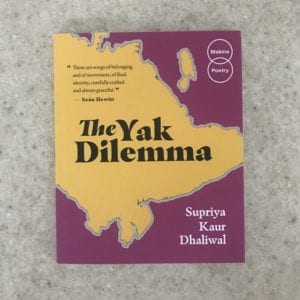 Let’s talk about The Yak Dilemma by Supriya Kaur Dhaliwal from Makina Books, why is this book part of your summer reading choices?
Let’s talk about The Yak Dilemma by Supriya Kaur Dhaliwal from Makina Books, why is this book part of your summer reading choices?
Kate: I try to keep up with contemporary Irish poetry, so I’ve been reading Supriya Kaur Dhaliwal’s poems in Irish and international journals since I first encountered her and her work in 2018. Her debut collection, The Yak Dilemma, came out earlier this year with the London-based publisher Makina Books, and I’ve been dipping into it all summer. Despite the collection’s diasporic scope, these poems are intimate in their charting of daily life, whether that life be in Dublin, Ireland or Palampur, India. As Dhaliwal writes in the poem “Love in the Time of Diaspora,” “we were in the process of becoming displaced lovers // in the age of displaced postcards for displaced borders.”
Lily’s (Intern) Summer Book Choices
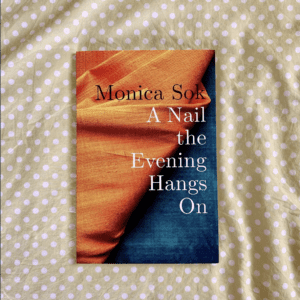 What brought you to this book for the summer?
What brought you to this book for the summer?
Lily: I first read A Nail the Evening Hangs On by Monica Sok last year, and, as I had never before read literature from a Cambodian or Cambodian American perspective, it’s stayed on my mind since. This collection examines the history and experiences of Cambodian diaspora, particularly in the aftermath of the Cambodian genocide. Sok looks closely at the ways historical events deeply inform personal and family memory, so much so that the two become inseparable. It’s a challenging and moving book—it really made me think in new ways.
Which poem in this collection stands out to you?
Lily: “Tuol Sleng,” the single long poem that makes up the second section of the book, is a powerful exploration of the themes of inherited history and trauma, memorialization, and remembrance. In the poem, the speaker visits the Tuol Sleng Genocide Museum in Phnom Penh with her young nephew, reflecting on each individual’s relationship to the history being presented in the exhibits. These lines always chill me: “[The tourists] cry. They write on the walls NEVER FORGET / signing their names. / Now they have been here.”
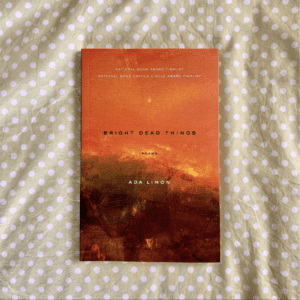 Let’s talk about Bright Dead Things by Ada Limón from Milkweed Editions, why is this book part of your summer reading choices?
Let’s talk about Bright Dead Things by Ada Limón from Milkweed Editions, why is this book part of your summer reading choices?
Lily: My fellow interns actually recommended this book to me when the summer internship began—and I am so glad that they did! Limón’s poetic voice is unmistakable; there is no other way to describe it except as life-giving. As I read these poems, I felt the urgency of human experience and emotion expressed in Limón’s simple but vibrant language. Even the mundane is extraordinary. As the speaker in “In the Country of Resurrection” says, “You’ve gone to get us gas station coffee / and there is so much life all over the place.”
Johnny’s (Intern) Summer Book Choices
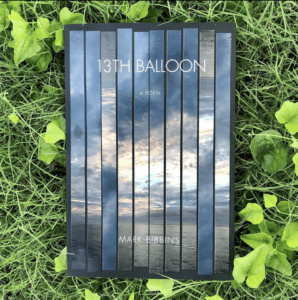 What brought you to this book for the summer?
What brought you to this book for the summer?
Johnny: During Pride Month in June I was thinking about how I’ve read a lot of prose but not much poetry regarding the AIDS crisis. 13th Balloon by Mark Bibbins powerfully weaves tender anecdotes and solemn lines of retrospective wisdom in his verses to create a more complete view of himself and all those around him as they navigated those times. I thought this was such a complicated exploration of the powers of memory and the possibilities of reclaiming such a grief-stricken history. It’s a love letter and elegy but also an important cultural snapshot.
Which poem in this collection stands out to you?
Johnny: I enjoy the sequence on page 24, [We didn’t have a word for us but what], and how it explores all the uncertainties and stormy energies left behind after losing a lover. “I have only language for you now / a language / that morphs like a virus / to elude to survive to connect / but I still don’t / have the word.” Many other ending lines in this book are emotionally wrenching, always carrying memories forward and attempting to make more sense of a collective void.
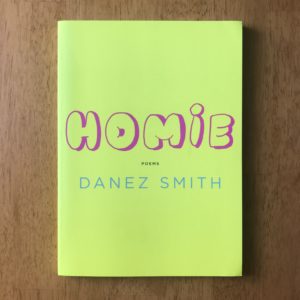 Let’s talk about Homie by Danez Smith from Graywolf Press, why is this book part of your summer reading choices?
Let’s talk about Homie by Danez Smith from Graywolf Press, why is this book part of your summer reading choices?
Johnny: I finally got a chance to read this book recently and I’m so glad I did—it makes for a nice “companion” to 13th Balloon, exploring a more contemporary and intersectional experience. Smith writes about racism and the stigmatization of being HIV-positive among other things, but with such a refreshing confidence in their voice. These poems open up to explore relationships and questions of solidarity, personal roots, friendships and intimacy, and overall figuring out how to navigate this world with all its injustices but celebrate, too, some of its deep communal joys.
Marisa’s (Digital Content Manager) Summer Book Choices
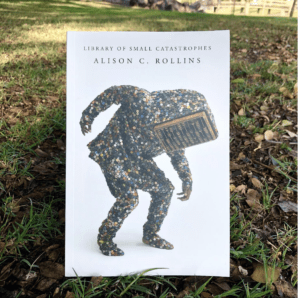 What brought you to this book for the summer?
What brought you to this book for the summer?
Marisa: To me, summer is a season of memory and Library of Small Catastrophes by Alison C. Rollins captures memory effortlessly. Rollins beautifully unravels the personal, ancestral archive within each of her poems. When I finished the book, I was lying on a beach cliffside in California overlooking the Pacific Ocean. And when I read the lines “She knows objects / can disappear behind a god’s back / but that doesn’t mean they are gone.” from “Object Permanence”, I looked up to see this expansive ocean. I suddenly felt so touched by the world, so moved by the water this book created.
Which poem in this collection stands out to you?
Marisa: I find myself coming back to “Self-Portrait of Librarian with T.S. Eliot’s Papers” and the lines “Have we no couth? / Have we not been trained / to know good things come to those who wait? / Each year we gather round the cave.” The image of a crowd gathering around a cave, mouths open, and asking is a poignant and joyous image. While the poem centers itself around forgetting, it is a poem that continues to stays with me.
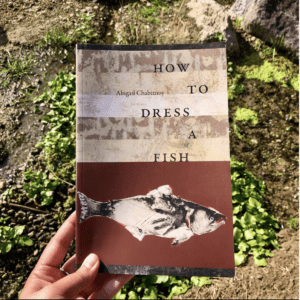 Let’s talk about How to Dress a Fish by Abigail Chabitnoy from Wesleyan University Press, why is this book part of your summer reading choices?
Let’s talk about How to Dress a Fish by Abigail Chabitnoy from Wesleyan University Press, why is this book part of your summer reading choices?
Marisa: How to Dress A Fish by Abigail Chabitnoy found its way to me after I watched the Line/Break series episode with Natalie Scenters-Zapico who highly recommended this book. How to Dress A Fish works to erase and unearth harm in order to rest. Chabitnoy’s repetitive, revolving images layered depth and texture to the personal narrative between Chabitnoy and her great-grandfather, who was taken from Alaska to Carlisle Indian School. With each page, I could see memories and emotions being unfolded, broken down to their core essence, and reformed with new intensity.
Elaina’s (Editor) Summer Book Choices
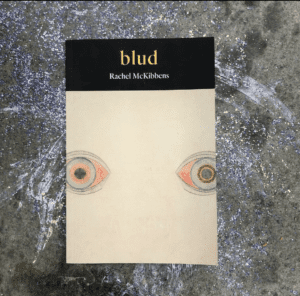 What brought you to this book for the summer?
What brought you to this book for the summer?
Elaina: This is a summer of pandemic, grief, and smoke. When I pick up a poetry book lately, I need it to be able to bear the weight of reality. blud by Rachel McKibbens is the right friend for this season, that friend who knows to skip the small talk: “stop the scorched fog of language that redirects the eye. say what you mean.”
As I’m rereading it, blud is teaching me about emotional sobriety. How to stand in a lineage of violence and confusion and find a thread of clarity. How to follow and follow and follow that thread.
Which poem in this collection stands out to you?
Elaina: blud includes some of the most generous and honest writing about childhood (queer) sexuality that I’ve ever encountered. “the sandbox” details schoolyard kissing games in rushing fragments: “Behind the shed / I played the husband / brutish breadwinner / choking her flesh / in my troubled hands.” McKibbens doesn’t belittle the thunder in these early moments—“Every afternoon I became a god reinventing sky”—but she writes with the wisdom of an adult who understands what was at stake and at play back then, “the white horse of masculinity bucking on the inside.”
 Let’s talk about Inheritance by Taylor Johnson from Alice James Books, why is this book part of your summer reading choices?
Let’s talk about Inheritance by Taylor Johnson from Alice James Books, why is this book part of your summer reading choices?
Elaina: Johnson writes, “Summers are for lovers and a quiet death in the house. A new friend asked me where my wildness lives, and I remembered I have a body. The clovers have taken over the front yard.”
The pandemic and chronic illness have made me a domestic animal. So where does my wildness live? In a book like this. Like blud, the poems in Inheritance are earthbound but also free, sprawling, philosophical, in praise of pleasure, dispersed in music. “No denying how I got here, I laid down among the tall grass / and came up a specter. I came up everywhere.”
Julie’s (Operations Manager) Summer Book Choices
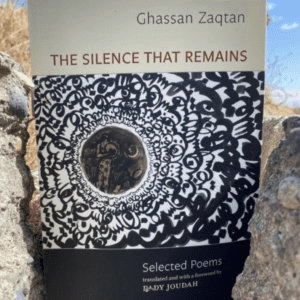 What brought you to this book for the summer?
What brought you to this book for the summer?
Julie: As a novelist, I work to express my stories in ways more primal and accepting of silence. I turn to poetry to relearn the immediacy of language and the importance of embracing the void. In Palestinian poet Ghassan Zaqtan’s The Silence That Remains, we live inside the shadows, the questions, the silences, allowing for the possibility that the unsaid is the most important lesson of all.
As I read this collection, Afghanistan was falling apart in the wake of the U.S. military’s withdrawal. I felt deeply his question, “Will the children forgive the generation/that’s trampled by horses of war/by exile and preparation for departure?” In his introduction, translator Fady Joudah writes, “The silences in this book are as universal and collective as they are individual and singular.”
Which poem in this collection stands out to you?
Julie: I was so moved by Zaqtan’s invitation and celebration of the quotidian in a time of endless war. “Fingers” describes the moment of silence between a bomb blast and the ensuing chaos and the lives still underway in that moment: “Fingers that make the bed/fold clothes, and organize photos/one garden at a time/so that peace may enter stone.”
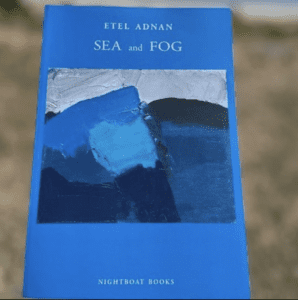 Let’s talk about Sea and Fog by Etel Adan from Nightboat Books, why is this book part of your summer reading choices?
Let’s talk about Sea and Fog by Etel Adan from Nightboat Books, why is this book part of your summer reading choices?
Julie: I sought to complement my reading of Zaqtan with an Arab woman’s perspective. Born and raised in Lebanon, educated in France and the U.S., and now living in California, Adnan also writes of the suffering wrought by conflict. This collection weaves essay and poetry together into a series of meditations that are lush and heartbreaking, and yet full of empathy: “Humanity is an ocean, each person a bubble, appearing, disappearing, and reappearing on its turn.” Adnan reminds me that what is important is to keep reappearing.